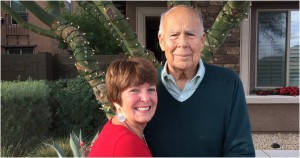 A survivor and his wife offer advice for coping.
A survivor and his wife offer advice for coping.
At 71, Bob Seiter was an active guy. After retiring from Kaiser Aluminum, where he worked in sales, he played golf three times a week, playing at a 14 handicap and striving to regain his 4. When he wasn’t on the fairway, he spent a lot of time volunteering.
Then one morning, he had a hemorrhagic stroke, and everything changed. His wife, Sue, found him in the garage, alarmingly disoriented, called 911 and prayed. Bob was rushed to the hospital, where he spent three weeks in intensive care, clinging to life. The doctors warned Sue that Bob wasn’t expected to make it. But one day he opened his eyes and awareness began, slowly, to return.
Coming Back to a New Life
Then came 5 1/2 grueling weeks in a rehab facility. Then came reality. Bob recovered from the acute phase of the brain trauma, but he may never get back to normal. He doesn’t have some of the cognitive capabilities he used to have. He can’t, for example, immediately recall numbers, such as age or quantity. Ask him his own age, and he can’t answer until he first counts 40, 50, 60, 70, 71, 72, 73.
His short-term memory is poor. He might forget where the TV remote is, whether he turned off the stove or where the newspaper he’s reading is. (He can’t manage reading a book yet.) He still has trouble recalling specific words or places, such as the cities where his children and grandchildren live. “I’ve had to recraft myself,” he said. “And that means learning how to do basic things again — and accepting that I’ll never be able to do some things I used to do ever again.”
Keeping Active And Keeping Perspective
What Bob does do is stay active. He’s taking golf lessons to regain some of his former prowess. He plays about once a week now, and sticks to 9-hole courses, since he tires easily and finds it impossible to make par on par-5 holes. He’s taken up rowing and hopes to further challenge himself by switching from doubles to singles.
While his brain recovers and he works on his physical fitness, he’s also keenly aware of two other areas that need healing: his emotional and social life. Sue and Bob both want to share what they’ve learned from this experience. First, Bob’s list of five realities he wants other stroke victims and their loved ones, friends and colleagues to understand:
Expect your life as you knew it to end. You must begin a new life post-stroke without trying to go back totally to your old one. You won’t be able to simply pick up where you were before the stroke. “You and your family and friends will have to work together to make this happen,” he says.
Expect to lose your full independence. This means no driving, even with someone else in the car. You may have to give up being alone for extended periods of time. You’ll also have to have someone accompany you for walks and activities. If you’re used to solitude, this may be jarring, but it’s a necessary safety precaution.
Expect to lose some friends and gain some others. While people will be kind overall, others, even close friends, may be uncomfortable with someone who’s in some way disabled. Be patient. For some people, the awkwardness creates a rift; they may not know what to say or how to behave around you, and/or they may have trouble managing their shock or sadness at your new limitations. If these people come around, great; if they don’t, that’s the way it goes. Accept it, don’t dwell on it and focus on finding new friends.
Keep focusing on improvement. Even after a catastrophic brain injury, the body still can recover. Can you recover everything? No, but it’s up to you to do the best you can, to be the best person you can be and keep pushing to improve. “I don’t know how much better I can get, but I’m cool with that,” Bob said.
Think of your caregiver. It’s natural for anyone recovering from a serious medical emergency to be self-absorbed. But it’s especially important to be considerate of the loved ones who are also deeply affected by your situation. Bob puts it this way: “I’m not in this by myself. I’m in this with a partner who’s incredibly caring, and I don’t want to compromise her position in this life. I want to be a contributor, and in order to do that I have to respect her wishes. I must be gentle with myself and with her, and that means fighting the frustration (and often anger) when I can’t remember how to do common things, like take my pills. I have to make up for the fact that I’m hard to live with when I’m acting or reacting badly.”
Now, Sue’s four tips for partners and caregivers of people who’ve suffered a stroke:
Don’t delay calling 911 if you even suspect someone is having a stroke. Know the symptoms (see below) and be vigilant.
Expect your life to dramatically change. You will have new responsibilities, such as scheduling care (if there’s a paid companion or home care worker) and managing transportation. You’ll have to take over some of the responsibilities your partner used to shoulder — from handling family finances to managing home maintenance. “You’ll need to be really organized, especially if you’re still working,” she said.
Develop a new long-term strategy to take care of yourself. Don’t get lost in the caregiving, which can easily get overwhelming. It’s too easy to realize weeks later that you have had no time to yourself. See your friends. Take regular breaks. Take care of your health. You’ll need energy and stamina to take care of a loved one (and yourself) in newly difficult circumstances.
Let your family and friends help. Be honest with them about how they can help. There is nothing to be embarrassed about. They will be happy to step in periodically in small and large ways. The Seiters are progressing, inventing solutions and tackling limitations one day at a time. They’ve just gotten a puppy named Oliver who will, with training, become a service dog for Bob. Oliver will even be able to find the TV remote.
Stroke Symptoms
Likely symptoms of stroke, according to the American Stroke Association:
- Sudden face drooping
- Sudden numbness or weakness of the leg, arm or face
- Sudden confusion or trouble understanding
- Sudden trouble seeing in one or both eyes
- Sudden trouble walking, dizziness, loss of balance or coordination
- Sudden severe headache with no known cause
If someone you know shows any of these symptoms, immediately call 911 or emergency medical services. For more information, visit the American Stroke Association.
Article by George H. Schofield, Ph.D. for Next Avenue.







Leave a Reply